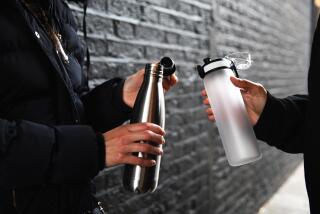Fear kidney stones? Drink lemonade
I have bouts of kidney stones every five to seven years. I am white, male, 60 years old and in otherwise good health. Will folic acid, vitamin B-12 and water reduce these bouts?
CLIVE
Hubertus, Wis.
There’s no evidence that folic acid or vitamin B-12 will reduce occurrence of kidney stones, but certain dietary adjustments, such as boosting water intake, might help, says urologist Dr. Gary Bellman, director of Kaiser Permanente’s urology residency program in Los Angeles.
Although some physicians recommend that recurrent stone formers (as sufferers are known) guzzle up to 10 cups of water a day to flush out budding stones, Bellman says a better strategy is to monitor the color of your urine and increase water intake accordingly. Yellow urine is generally very concentrated, he says, suggesting more water is needed. Light urine already is sufficiently diluted.
Drinking lemonade, which is high in citrate, may also help. Research suggests that citrate, a naturally occurring chemical widely distributed in the body, inhibits the formation of the calcium oxalate crystals that are found in most stones. Recurrent stone formers who are low or deficient in citrate, Bellman says, may also benefit from a prescription citrate supplement (Urocit-K).
About 75% of stones are made of calcium oxalate. (Others may be composed of calcium phosphate or uric acid, and still others are infection-based.) Although physicians no longer recommend curtailing calcium to prevent stones as they once did, they do discourage overindulgence in foods and drinks high in oxalates, including teas, colas, sodas, chocolates, nuts, rhubarb and spinach.
Finally, Bellman says, limit intake of salt and red meat, both of which fuel kidney stones.
But even with these precautions, there might be a kidney stone in your future. “Certainly, with these dietary and medical therapies we can decrease the incidence,” Bellman says. “But even with medication, you can’t tell somebody that they’re never going to form a stone again.”
Do you have a health- or fitness-related question for Times reporters? Go to latimes.com/healthqa. Questions must be general, and not all can be answered.




